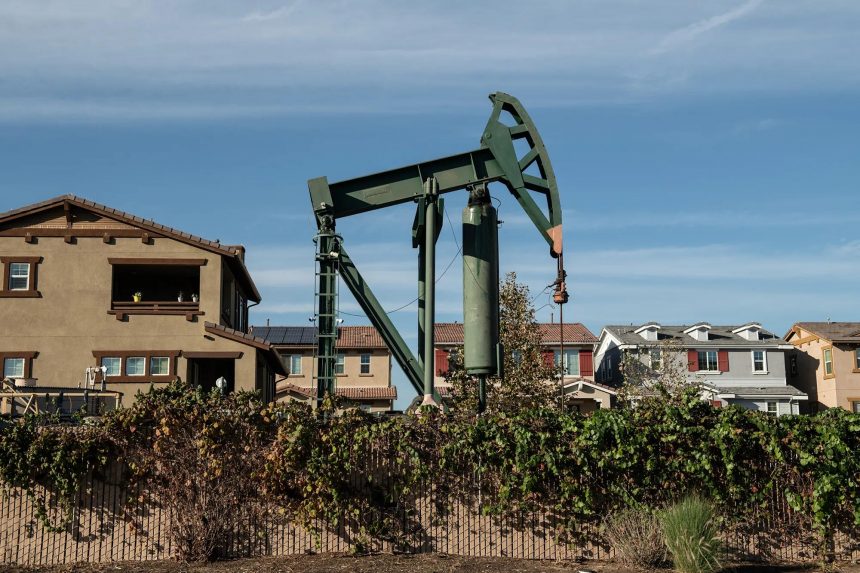This story was originally published by CalMatters. California’s oil industry has decided to withdraw its contentious ballot measure that aimed to challenge a state law imposing new restrictions on oil and gas wells located within 3,200 feet of homes and schools. Despite spending $20 million to gather signatures for the November ballot initiative, the industry has pulled it just before the deadline. Instead of pursuing the referendum, the companies plan to challenge the law in court. Environmentalists view this as a significant victory, as it clears the way for a law that prohibits new drilling and enforces safety measures on existing wells in communities. Oil industry groups argue that the referendum was misrepresented by environmental organizations, claiming that the setback law will result in job losses, higher gas prices, and increased reliance on imported oil for California. They estimate that complying with the law will cost them approximately $40 million in the first two years. Jonathan Gregory, Chairman of the California Independent Petroleum Association, stated, “Supporters of the energy shutdown can make baseless claims in the press and advertisements, but they cannot do so in court without evidence. That’s why we are shifting from the referendum to a legal strategy.” The proposed ballot measure aimed to overturn a law passed in 2022 by Sen. Lena Gonzalez, a Democrat from Long Beach, which established buffer zones around neighborhoods. The legislation prohibits new oil and gas wells near homes, schools, and other sensitive areas, and requires operators of existing wells to enhance safety measures, such as installing leak detection equipment, testing water quality, and controlling pollution. Once the ballot initiative is formally withdrawn from the Secretary of State’s office, the state’s setback regulations will come into effect. Existing well operators within the buffer zones must develop safety plans by 2025 and implement them by 2027. California has approved over 240,000 oil and gas wells across the state, with numerous concentrations in Kern County, the Los Angeles region, and Long Beach/Signal Hill. Following the enactment of SB 1137, the oil industry initiated a campaign dubbed “Stop The Energy Shutdown” to put the legislation before voters in the November ballot, temporarily suspending its enforcement. During this period, new permits for maintenance work on existing leaking or unproductive wells within these areas reportedly surged. Governor Gavin Newson remarked, “Big Oil saw what they were up against – and they folded, again. No parent in their right mind would vote to allow drilling next to daycares and playgrounds.” The health hazards associated with oil operations have been at the core of a longstanding movement to shield families, students, and seniors from the repercussions of drilling activities. The growth of the oil and gas sector in various regions preceded the urban expansion of California, resulting in drilling and refining facilities near residential areas. More than 2.5 million Californians reside within 3,200 feet of an oil or gas well, with the majority being low-income and predominantly non-white neighborhoods who have borne the brunt of health issues from oil drilling. Mabel Tsang, political director for the California Environmental Justice Alliance, emphasized the multi-generational health impacts suffered by these communities due to oil drilling. The withdrawal of the ballot initiative represents a triumph for environmental advocates over oil and gas interests, who spent approximately $60 million lobbying against the initial legislation and promoting the referendum. Assemblymember Isaac Bryan, a Democrat from Culver City, brokered an agreement with the oil industry to remove the measure from the ballot. Bryan dismissed the lawsuit threat made by oil producers as an “act of desperation.” As part of the accord, Bryan will amend a bill he authored, mandating the plugging or abandonment of low-producing wells near neighborhoods, limiting its application solely to the Inglewood Oil Field, California’s largest urban oil field. The oil industry had expressed concerns over proposals requiring the treatment or closure of abandoned wells due to the significant costs involved. Numerous bills that remain under consideration in the Legislature are targets for environmental activists who vow to persist in their advocacy efforts. “There’s no giving up for us,” Tsang declared. “We have played their game and defeated them using their own tactics.” Alexei Koseff contributed to this report.
As provided by CalMatters, the information presented exceeds 200 characters and cannot be used as part of an article generation.





